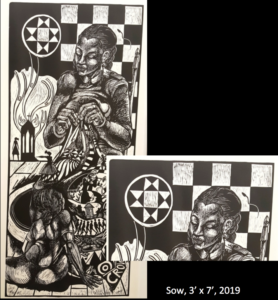According to The America Play by Suzan-Lori Parks, withholds two definitions ” 1. the action or fact of possessing or the condition of being possessed. 2. the holding or having of something as one’s own, or being inhabited and controlled by a demon or spirit.”
Parks explains how she possesses her writing and who she writes for. Her answer was herself. Her second answer is the question, “Who am I?” To me, I understood this to be that she writes for an audience who reflect herself and her own experiences as an African-American woman and her past. I was able to relate The America Play to Toni Morrison’s book The Bluest Eye and her explanation about why the book was written and how it was written in the Afterward of the book. Toni Morrisons states, “With very few exceptions, the initial publication of The Bluest Eye was like Pecola’s life: dismissed, trivialized, misread.”
The Bluest Eye is an African-American fiction book written to prove that the book Dick and Jane: fun with dick and jane does not represent the perfect family and in most cases whether black or white, the book proposes a story that is unrealistic unless you come from a middle-class family, with a perfect home and perfect parents. Toni Morrison possesses her writing by sharing an experience that may not be hers exactly but, there are experiences that she can relate to and actually understand, which is why she did not write for a specific audience but for herself. Suzan-Lori Parks also says, “Through each line of text I’m rewriting the Time Line— creating history where it is and always was but has not yet been divined.”
In The Bluest Eye, Morrison has the exact same setup. She rewrites a story that doesn’t exactly exist but in a way has existed. She incorporates scattered experiences and historical realities that still prove another fiction book that is supposed to be doing the same thing.
When I say, “doing the same thing,” I mean that Dick and Jane was written to propose a reality; but it does not. It is not relatable for any ethnic group and children who grow up under different financial circumstances. Even without the topic of social class and ethnicity, it does not represent all families because Dick and Jane’s parents play with them and seem perfect. Realistically with or without money, being or not being white, there is no such thing as a perfect household. Rather, the book proposes a household and family that you can aspire to live and be like but does not exist. The Bluest Eye, on the other hand, is a fiction book that proposes a reality that has existed for African American children and in some circumstances, other ethnic groups throughout history as well.
Just as Parks “creates a history where it is and always was…” Morrison creates a history where it is and always was and still is. Racism still exists and many Americans still their lives just as Pecola lived, feeling “dismissed, trivialized, misread.” Morrison possesses her writing by relating it to herself and for those who relate to her and Pecola’s experiences.

